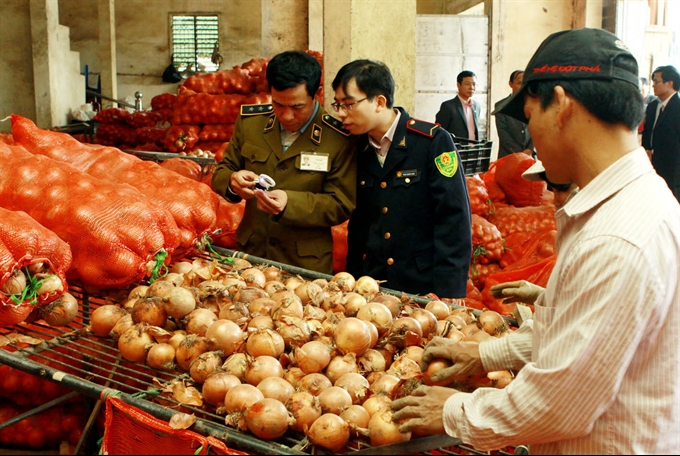 Society
Society

Hà Nội must step up inspections on hot spots at whole sale markets such as Long Biên, Ngã Tư Sở and Phùng Khoang markets to block contaminated food from being moved to small-scale markets within the city, a health official said.
 |
| Inspectors check fruits and vegetables at a shop in Hà Nội’s Mê Linh District. This week the Health Ministry will issue an instruction on steps to improve inspection quality. — VNA/VNS Photo Dương Ngọc |
HÀ NỘI — Hà Nội must step up inspections on hot spots at whole sale markets such as Long Biên, Ngã Tư Sở and Phùng Khoang markets to block contaminated food from being moved to small-scale markets within the city, a health official said.
Deputy Minister of Health Nguyễn Thanh Long said on Wednesday at a meeting with the city’s authorities that he hoped a similar team like the city’s Task Force 141 could be set up for food safety inspectors.
The Task Force 141 is made up of mobile police and traffic police who detect and prevent hooliganism and criminal activities, including theft and traffic violations.
“We hope food safety inspectors will be police officers who can impose punishments right after the violations are discovered,” Long said.
He pointed out that many ward-level food safety and hygiene inspectors in Hà Nội lack knowledge about regulations, leading to ineffective inspections.
The trial model of food inspectors at ward level, following the Prime Minister’s decision, kicked off in January this year. It aims to set up forces at ward level in the city who are allowed to make unscheduled inspections and impose punishments on the spot.
The force at each ward includes medical officers, judicial officers and police officers, and must be led by a leader of the ward’s People’s Committee.
Ten wards of five districts in Hà Nội have joined the model so far.
However, the model shows a lot of weaknesses. Officers have to take over several positions at their ward so it is very hard for them to complete the task of inspectors, local authorities of the ten wards said at the meeting.
In fact, most of the inspections were planned and announced to the sellers five to seven days before, they added.
They said that punishments for the violations remain humble - mostly warnings and reminders.
Hà Thị Lê Nhung, deputy chairwoman of the People’s Committee of Đống Đa District, one of the districts joining the model, said that food producers and businesses in the district were located in tiny alleys or did not have fixed locations. That, plus a shortage of inspectors, made the process difficult.
Hoàng Đức Hạnh, deputy director of the municipal Health Department, said that the inspectors only checked business licences, infrastructure and equipment. They didn’t check the origins of the food. Inspectors needed to be taught how to take food samples for testing.